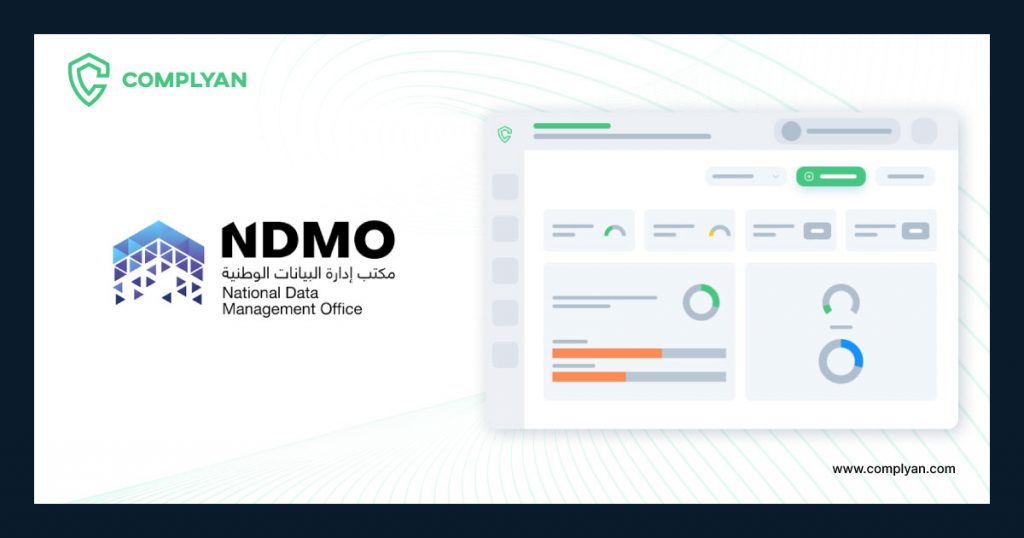How to Improve Data Management with the NDMO Data Protection Regulation and Complyan

Data is the lifeblood of the digital economy. It fuels innovation, drives growth, and enables better decision-making. But data also comes with risks and responsibilities. How can organizations ensure they manage and protect their data responsibly and securely?
This is where the National Data Management Office (NDMO) comes in. The NDMO is the national data regulator in the Kingdom of Saudi Arabia, which aims to create a data-driven culture and foster a data-enabled society. To achieve this vision, the data management office has developed the Data Management and Personal Data Protection Standards, which set out the requirements and best practices for data management and personal data protection across government entities.
In addition to being required by law, compliance with NDMO standards has strategic benefits. By adhering to these standards, organisations can increase their data quality, security, privacy, operational effectiveness, customer happiness, and reputation. Organizations that comply with regulations are less likely to face fines, penalties, or legal action.
In this blog post, we will explore how Complyan can help organizations achieve compliance with the NDMO data management standards.
Overview of the NDMO Data Management and Personal Data Protection Standards
The NDMO Data Management and Personal Data Protection Standards are a set of requirements and best practices for data management and personal data protection across government entities in Saudi Arabia. The standards were developed by the National Data Management Office (NDMO), which is the national regulator of data in the Kingdom. The NDMO aims to create a data-driven culture and foster a data-enabled society.
The NDMO standards are based on the National Data Management and Personal Data Protection Framework, which defines the vision, principles, objectives, and roles for data management and personal data protection in the Kingdom. The framework also outlines the nine domains of data management that cover the entire data lifecycle, from creation to disposal. These domains are:
- Data Governance: This domain outlines a set of policies, processes, roles, and responsibilities that ensure effective and efficient data management and personal data protection.
- Data Catalog and Metadata: The collection and maintenance of information about the data assets, such as their description, location, ownership, quality, and usage.
- Data Quality: This domain discusses the degree to which the data assets meet the data consumers’ and stakeholders’ expectations and requirements, and various controls to improve it.
- Data Operations: The data operations domain outlines controls centered around activities and tasks that enable the creation, acquisition, storage, processing, distribution, and disposal of data assets.
- Document and Content Management: Controls in this domain provide guidelines for managing unstructured or semi-structured data assets, such as documents, images, videos, etc.
- Data Architecture and Modeling: Discusses the design and implementation of the logical and physical structures that support the data assets and their relationships.
- Data Sharing and Interoperability: The controls that guide the exchange and integration of data assets across different systems, platforms, formats, and standards.
- Reference and Master Data Management: This addresses the management of common or shared data assets that provide consistent and authoritative information across different systems and processes.
- Personal Data Protection: This domain contains security controls and guidelines that protect personal data from unauthorized or unlawful access, use, disclosure, modification, or destruction.
The NDMO standards specify the controls and specifications for each domain that need to be implemented and followed by the government entities. The standards also provide guidance on how to measure and monitor compliance performance and maturity levels for each domain.
The NDMO standards are significant for promoting responsible and secure data practices in the Kingdom. By complying with the standards, government entities can:
- Enhance their data quality, security, and privacy
- Improve their operational efficiency, customer satisfaction, and reputation
- Avoid potential fines, penalties, or legal actions for non-compliance
- Support the Kingdom’s Vision 2030 for digital transformation
Challenges of Compliance with the NDMO
Compliance with the NDMO standards is not an easy task. Organizations face many challenges in implementing and maintaining effective data management and personal data protection practices. Some of these challenges include:
- Complexity: The NDMO standards cover nine data management domains, such as data governance, data quality, data operations, etc. Each domain has its own specifications and controls that must be followed. Organizations need to understand and align their policies and processes with these specifications and controls.
- Lack of resources: Compliance with the NDMO standards requires adequate resources, such as skilled staff, tools, and technologies. Organizations may not have enough resources to dedicate to compliance activities or to keep up with evolving regulations and standards.
- Changing regulations: The NDMO standards are not static. They are subject to change and update as the data landscape evolves. Organizations need to monitor and adapt to these changes to ensure continuous compliance.
How can organizations overcome these challenges and achieve compliance with the NDMO standards? This is where Complyan comes in. Complyan helps organizations identify and mitigate potential non-compliance, cyber risks, and data breaches by streamlining the compliance process toward cybersecurity.
How Complyan Supports Compliance with the NDMO Standards

- Data Governance and Data Management
Data governance and management are essential for ensuring effective and efficient data management and personal data protection. The NDMO standards require government entities to establish robust data governance frameworks that define and align policies, processes, roles, and responsibilities for data management and personal data protection. The standards also require government entities to implement data management practices that ensure data classification, access controls, and data retention management.Complyan’s Data Security and Privacy Module can help organizations establish robust data governance frameworks that align with the NDMO requirements. The module allows organizations to:
- Define and document their data policies and procedures
- Assign roles and responsibilities for data management and personal data protection
- Monitor and measure their compliance performance and maturity level
- Generate reports and dashboards to visualize their data governance status
- Classify their data assets based on their sensitivity, criticality, and value
- Apply appropriate access controls to their data assets based on their classification
- Manage their data retention policies and schedules based on their legal and operational requirements
- Data Privacy and Consent Management
Data privacy and consent management are crucial for protecting personal data from unauthorized or unlawful access, use, disclosure, modification, or destruction. The NDMO standards require government entities to obtain and manage consent for data processing from the individuals whose personal data they collect or process. The standards also require government entities to ensure compliance with the NDMO requirements related to data privacy and individual rights.Complyan’s Data Security and Privacy Module assists organizations in obtaining and managing consent for data processing from the individuals whose personal data they collect or process. The module allows organizations to:- Define and document their consent policies and procedures
- Collect consent from individuals using various methods, such as web forms, emails, SMS, etc.
- Manage consent records and preferences using a centralized database
- Update or withdraw consent as per the individuals’ requests
- Identify and map their personal data assets across different systems and processes
- Apply appropriate security measures to protect their personal data assets from unauthorized or unlawful access, use, disclosure, modification, or destruction.
- Respond to individuals’ requests to access, correct, delete, or transfer personal data.
- Notify individuals and authorities of any personal data breaches or incidents.
- Data Security and Protection
Data security and protection are vital for ensuring the confidentiality, integrity, and availability of data assets. The NDMO standards require government entities to implement appropriate security measures to protect their data assets from unauthorized or unlawful access, use, disclosure, modification, or destruction. The standards also require government entities to conduct risk assessments, implement security controls, and plan for incident response.Complyan’s Cyber Risk Management Module helps organizations implement appropriate security measures to protect their data assets from unauthorized or unlawful access, use, disclosure, modification, or destruction. The modules allow organizations to:- Conduct risk assessments using industry-standard methodologies, such as FAIR
- Identify and prioritize their cyber risks based on their impact and likelihood
- Implement security controls based on best practices and standards
- Manage risk mitigation plans and track progress
- Define and document their incident response policies and procedures
- Assign roles and responsibilities for incident response
- Detect and analyze incidents using various sources of information
- Contain, eradicate, and recover from incidents using predefined actions
- Report incidents to relevant stakeholders
- Third-Party Risk Management
Third-party risk management is important for protecting data assets that are shared with external parties. The NDMO standards require government entities to assess and manage risks associated with data sharing with third parties. The standards also require government entities to ensure compliance with the NDMO requirements related to third-party data handling.Complyan’s Third-Party Risk Management Module supports organizations in assessing and managing risks associated with data sharing with third parties to ensure compliance with the NDMO requirements related to third-party data handling. The module allows organizations to:- Define and document their third-party risk management policies and procedures
- Identify and classify their third parties based on their risk profile
- Conduct due diligence on their third parties using various methods such as questionnaires, surveys etc.
- Monitor third-party performance using various indicators such as SLAs KPIs etc.
- Manage third-party contracts agreements, NDAs etc.
- Define and document their third-party data-sharing policies and procedures.
- Apply appropriate security measures to protect their shared data assets from unauthorized or unlawful access use, disclosure modification, or destruction.
- Respond to third-party requests for accessing, correcting, deleting, or transferring shared personal data.
- Notify third parties of any shared personal data breaches or incidents.





 Governance and Policy Management
Governance and Policy Management